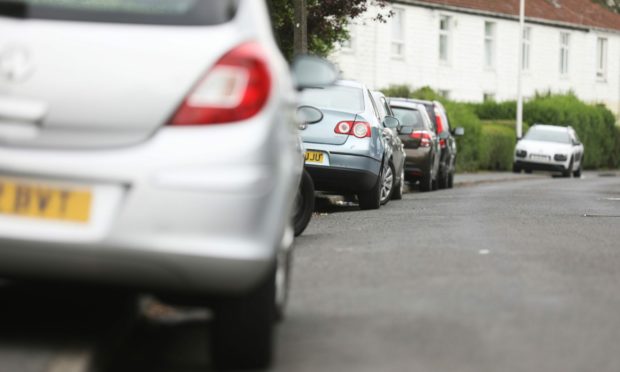Council bosses have complained fines are not high enough to stop bad parking.
Transport chiefs suspect parking charge notice (PCN) fines are so low some motorists consider them a “charge” rather than a deterrent.
They have also received reports of motorists seemingly content to receive multiple PCNs in one day.
Motorists currently caught breaking the rules pay the highest current possible charge – £60 dropping to £30 if paid within 14 days.
The government is considering upping the charge to one of between £40 and £60 for fines paid within the 14-day period.
The Scottish Government has ordered the first review of the charge since 2011 after introducing new council powers to clamp down on bad parking.
The Scottish Government has not increased the charge since 2001.
The consultation document states “anecdotal evidence” has suggested “in some cases motorists may in effect be treating the PCN as a “parking charge”.
Motorists are: “Writing off the cost for undertaking recreational activities or attending events.”
We’re seeking your views on the levels of local authority Penalty Charge Notices to support compliance with #parking policy.
Find out more ➡️ https://t.co/XTDoKipvTc
Access the consultation ➡️ https://t.co/ysvuRdqRXO pic.twitter.com/LMLZrEuy2v— Transport Scotland (@transcotland) August 4, 2021
Transport bosses suspect some vehicle passengers contribute towards the cost rather than attempt to follow the rules.
It goes on the say other stakeholders “highlighted that the level of the charge may be insufficient to deter reoffending with some providing examples of motorists receiving multiple PCNs in a single day.”
Why are the changes being considered now?
Council parking wardens can now fine motorists for pavement parking, double-parking and parking at dropped kerbs.
The Scottish Government introduced the new powers in the Transport (Scotland) Act 2019.
Transport bosses are now consulting on the higher charges after turning down a similar request from local authority chiefs in 2011.
They are considering introducing higher and lower fines. The above offences will attract the higher rate.
The consultation document states councils are not able to use fines as a way to generate income. But only to offset their costs in enforcing the rules.
How has the Angus MSP and transport minister Graeme Dey explained the move?
Scottish Government transport minister Graeme Dey said parking has become a “contentious issue across our towns and cities.”
The Scottish Government was seeking to improve the country’s health and encourage active travel. Whilst making our streets more accessible for all, he added.
The Angus South MSP acknowledged Covid-19 schemes to encourage more people to walk and cycle may have reduced on-street options.
“An effective parking enforcement regime is critical to managing to keep Scotland moving (and parking) effectively,” he said.
